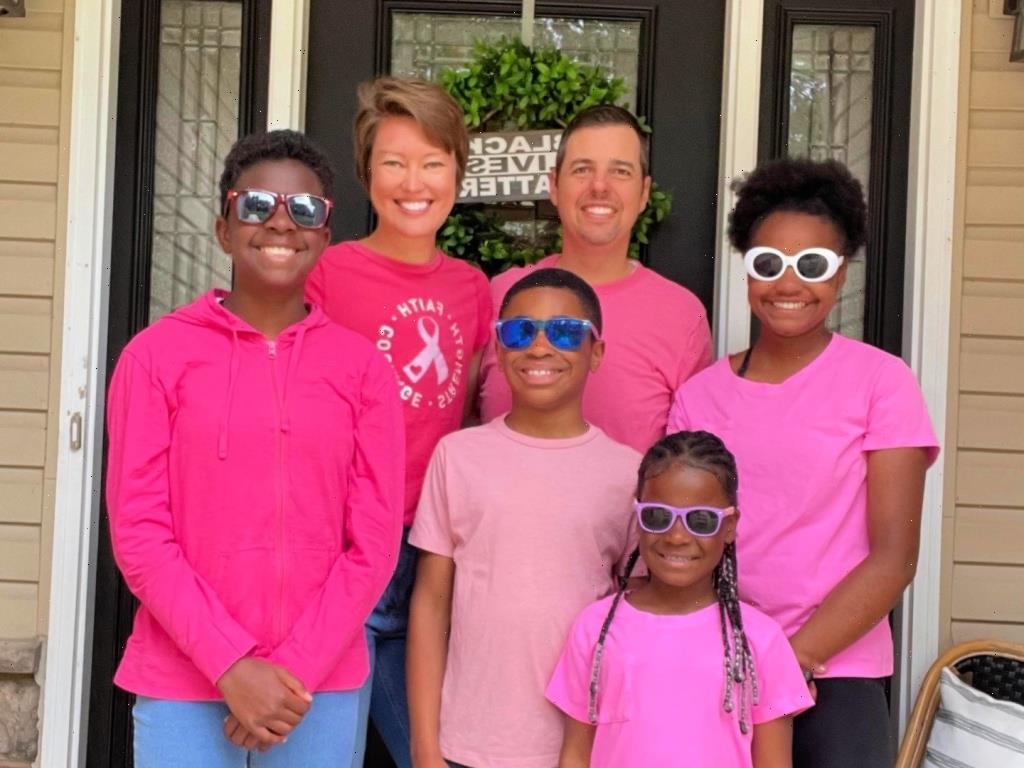My family of six is what I describe as multiracial, big, and adoptive. Each of my children was adopted domestically and trans-racially (we’re white; our kids are Black). They each came to us within two weeks of being born, and we have four open adoptions, meaning they have ongoing relationships with their birth families.
But the stranger who meets us — in the grocery store, in the airport, or at the library — doesn’t know much of this. They see a cluster of two white adults and four Black children who fit the bill of being an adoptive family. They, of course, don’t know the whole story.
Ever since we became a family-by-adoption we’ve faced many comments and questions — many of them some may deem curious. While we understand that adoption is still very much a mystery to many, we loathe when an initially-friendly adoption conversation quickly spirals into an interrogation.
We’ve been asked many poorly worded questions, including, “Why didn’t you have your own kids?” “How much did your children cost?” “Why did their real parents give them away?” “Why didn’t you adopt from another country?” Additionally, “Why didn’t you adopt from foster care?” “Are your kids real siblings?”
Some people take a different approach — one that’s meant to be complimentary. However, what they fail to do is consider how their praise impacts my children. The comment can go like this: “Your children have such good and loving parents.” This is almost always followed by them looking directly at our children and addressing them with a “You’re so lucky.”
There are multiple issues with the conclusion that adoption is a pretty, perfect package. First, as adoptive parents, we are not our children’s saints, saviors, or superheroes. The fact is, we chose adoption because we wanted to be parents. Given that I had a chronic, autoimmune disease that automatically equates to high-risk pregnancies, we knew that adoption was the right path for us to build our family. We didn’t go into adoption to “save” a child.
Second, the assumption is that our children had a hard-knock life, but we redeemed them from that. We’ve heard, so many times, that birth (or sometimes called real, biological, or natural parents) must be young, poor, drug abusers, who are sexually promiscuous. Clearly, birth parents cannot be good parents— but we, middle-class, white, suburban, educated adults, are superior.
I will not ever share my children’s birth families’ personal information — but I will clap back at the birth parent assumptions and say that my children’s birth parents, whom we have ongoing relationships with, are wonderful people. We consider it an honor to be our kids’ chosen second, adoptive parents — and we hope that we will always have a bond with our kids’ first families. Birth parent stereotypes are harmful, and they set up a precarious precedence when it comes to how the public views and treats adoptees — that is, people who were adopted.
There’s also the issue of hierarchy. Adoptive parents, who are put on a morality pedestal, are seen as do-gooders who take on charity cases: i.e, the children they adopt. Adoptee children are often declared as gifts — to be chosen and given. The reality in our family is that our children are our own, real children — not objects, and certainly not projects.
When someone dares to declare that our children are “so lucky to be adopted,” we are quick to come back and correct them. We always respond as we truly feel. We are the lucky ones. We were chosen to be our children’s second parents — and we are honored by the fact that we get to raise our children day-to-day.
Adoptees should never be pressured to feel “lucky” or blessed by the fact that their lives often began from a place of trauma. A baby (or child) being separated from their biological parents, no matter the reason, is a difficult journey. There can be feelings of rejection, questions of worthiness, shame, depression, anger, confusion, and much more. No matter how “good” the adoptive family is, an adoptee has the right to feel as they do about their adoption and the loss of their biological family.
Some of you may feel that us correcting the “lucky” complementers is a matter of semantics — as something that’s no big deal. However, we know from over 14 years of parenting adoptees that words matter. It’s up to us, the chosen parents, to correct and educate those who choose to approach us — because we believe that not only is this in the best interest of our children, but it also makes a difference in how that individual approaches the next adoptive family they see, and how they perhaps talk to (and teach) their own families and friends about adoption.
Perhaps you’re now confused. If you see a family like mine, what should you say? After all, there are plenty of things you shouldn’t. If you see any family that warms your heart, causing you to pause and smile, and you feel you must say something, the best thing you can offer to that family is this: “You have a beautiful family.” That’s it. No assumptions, no stereotypes, and no demands.
Source: Read Full Article

